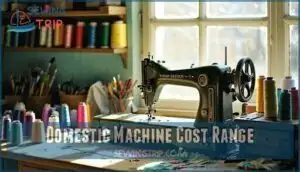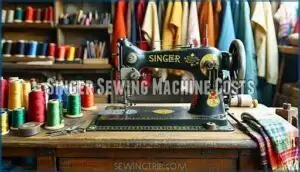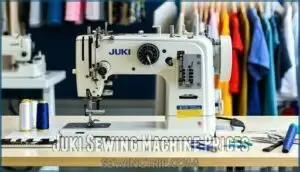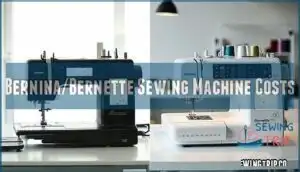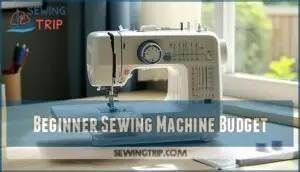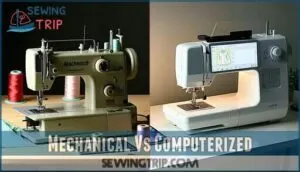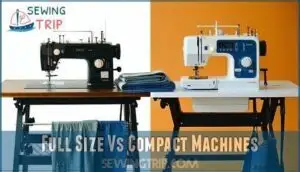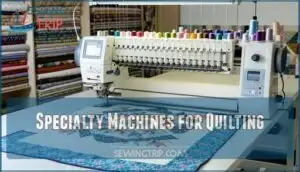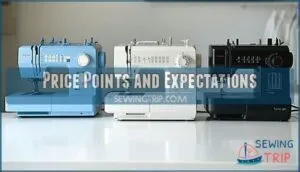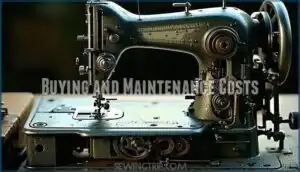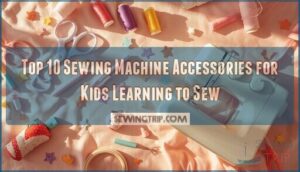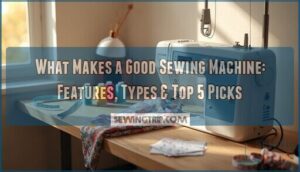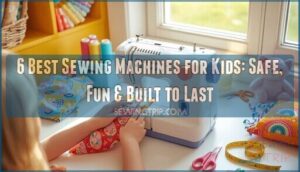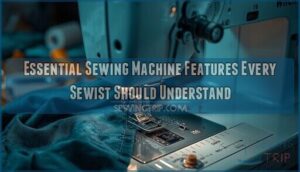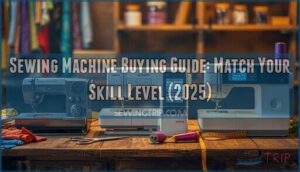This site is supported by our readers. We may earn a commission, at no cost to you, if you purchase through links.
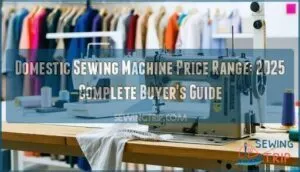
Entry-level mechanical machines ($150-$300) handle straight stitches and basic zigzag perfectly for beginners. Mid-range computerized models ($300-$1,200) offer automatic features, multiple stitches, and buttonhole functions.
High-end machines ($1,200-$5,000+) include embroidery capabilities, precision controls, and advanced stitch packages. Premium brands like Bernina can reach $15,000 with commercial-grade features.
Your budget should match your skill level and project complexity—you don’t need a Ferrari to learn parallel parking. Smart shopping means understanding which features actually matter for your sewing goals.
Table Of Contents
Key Takeaways
- Budget $150-$300 for entry-level machines – You’ll get reliable mechanical or basic computerized models with essential stitches that handle most beginner projects without breaking the bank.
- Expect $300-$1,200 for mid-range computerized features – You’ll gain automatic threading, multiple stitches, buttonhole functions, and better build quality that justifies the higher price point.
- Consider total ownership costs beyond purchase price – You’ll face ongoing expenses like annual servicing ($75-$150), accessories ($50-$500), and potential repairs that add to your investment.
- Match your budget to actual sewing needs, not aspirations – You don’t need a $5,000+ embroidery machine if you’re doing basic alterations, so buy based on your current skill level and realistic project goals.
Sewing Machine Price Factors
When you’re shopping for a sewing machine, several key factors directly impact the price you’ll pay.
Understanding these elements helps you make an informed decision that matches both your budget and sewing needs.
Sustainability Features Influence
Sustainability features increasingly drive sewing machine prices higher as manufacturers integrate eco-friendly materials and energy-efficient components.
Green innovations justify higher costs, but eco-conscious sewists embrace sustainable manufacturing’s premium pricing.
You’ll find these green innovations justify premium costs across most brands today.
- Eco-Friendly Materials: Recycled components and sustainable plastics add $50-150 to machine costs
- Energy Efficiency: Advanced motors with reduced power consumption increase prices by $75-200
- Ethical Production: Fair trade manufacturing and reduced waste processes contribute $25-100 premium
Warranty and Support Considerations
When evaluating sewing machines, you’ll find warranty length typically ranges from one to twenty-five years, with premium brands offering extended coverage.
Support channels vary substantially—some manufacturers provide phone, email, and chat options, while others rely solely on dealer networks.
Consider repair costs and parts availability, as these factors directly impact long-term ownership expenses and machine longevity.
Key Features to Consider
You’ll want to focus on stitch options, motor strength, and automation levels when setting your realistic budget.
Build quality affects your sewing machine price range substantially, while user friendliness determines long-term satisfaction.
Consider which key features matter most for your projects before finalizing your budget range – this targeted approach prevents overspending on unnecessary capabilities, ensuring a realistic budget.
Domestic Machine Cost Range
Understanding the factors that influence sewing machine pricing helps you navigate the domestic machine cost range more effectively.
You’ll find domestic sewing machines spanning from under $100 to over $3,000, with clear price point tiers based on functionality and features.
Domestic sewing machines range from budget-friendly basics under $100 to premium powerhouses exceeding $3,000.
Budget considerations start with basic mechanical models around $75-150, perfect for simple repairs and beginner projects.
Mid-range computerized machines fall between $250-700, offering automated features and decorative stitches.
Premium domestic models range from $700-1,500+, providing advanced capabilities for serious hobbyists.
The average machine cost has increased 12-15% since 2023, with electronic models now averaging $450.
When evaluating cost vs. features, remember that sewing machine prices directly correlate with capabilities – more functions mean higher costs.
Consider long-term value rather than just upfront sewing machine price, as quality machines last decades with proper care.
The sewing machine market is seeing significant market growth, projected to reach $7.26 billion by 2029.
Brand Specific Price Points
Different sewing machine brands offer distinct price ranges that match their reputation and target markets.
You’ll find Singer machines averaging $150-$500, while premium brands like Bernina can reach $20,000 for top-tier models.
Singer Sewing Machine Costs
Singer machines offer solid value across price tiers, from basic mechanical models at $140 to premium computerized units reaching $950.
Singer Durability shines in heavy-duty models, while feature value varies substantially between entry and advanced options. Many owners find that a vintage Singer machine still functions reliably today.
- Entry Models ($140-$250): M21 and M1605 series provide reliable basic sewing functionality
- Mid-Range Heavy-Duty ($230-$440): Models 4411 and 5511 offer metal frames and powerful motors
- Premium Computerized ($400-$950): Quantum Stylist 9960 includes advanced features and customization
- Used Market Value: Vintage Singer machines retain strong resale value, ranging $188-$5,650
Juki Sewing Machine Prices
Juki sewing machines command premium prices, typically ranging from $500 to $4,399 for domestic models.
These Japanese-engineered machines justify their sewing machine cost through exceptional build quality and professional-grade performance that rivals industrial counterparts.
Some Juki machines can also be used for embroidery, but embroidery machine pricing varies substantially.
| Juki Feature Tiers | Price Range | Key Features |
|---|---|---|
| Basic Mechanical | $500-$750 | Essential stitches, reliable motor |
| Computerized Models | $950-$1,700 | LCD screens, automatic threading |
| Premium Quilting | $3,000-$4,399 | Extended throat, speed control |
Juki Model Comparison reveals substantial price justification through durability and precision.
Industrial vs Domestic variants share similar engineering excellence, explaining higher costs.
Strong Juki Resale Value reflects the brand’s reputation among serious sewists who prioritize long-term performance over initial sewing machine prices.
Bernina/Bernette Sewing Machine Costs
Bernina sewing machines represent premium craftsmanship with prices starting around $1,499, while Bernette offers accessible alternatives beginning at $259.
This Bernina value versus Bernette durability comparison reveals substantial cost differences for similar functionality.
- Entry-level Bernette models ($259-$599) compete directly with other budget brands
- Mid-range Berninas ($3,499-$8,199) cost 2-3 times more than advanced Bernettes
- High-end Berninas ($10,000+) have no Bernette equivalent for investment analysis
- Feature justification varies considerably between brands’ model comparison offerings
Beginner Sewing Machine Budget
You’ll want to budget $150-$250 for your first sewing machine, which covers reliable entry-level models with essential features like automatic threading and basic stitches.
This price range gets you a quality mechanical or simple computerized machine that’ll handle most beginner projects without breaking the bank, providing a good introduction to basic stitches.
Entry Level Machine Prices
For beginners on a budget, entry-level sewing machines start around $150-$200, offering basic features without breaking the bank.
These affordable sewing machine options include mechanical models under $250 that handle essential stitching tasks.
A great place to start is by browsing machines for beginners.
When comparing brands for beginner sewing machine price justification, consider used options from Singer or Brother to reduce sewing machine cost substantially.
Essential Features for Beginners
When choosing your first basic sewing machine, prioritize easy threading systems and automatic needle threaders that eliminate frustration.
Look for clear stitch selection with essential straight and zigzag stitches, plus adjustable speed control for confident learning.
A durable build guarantees your affordable sewing machine withstands practice sessions, while clear instructions guide you through setup and operation successfully.
Regular maintenance helps prevent common sewing machine issues.
Where to Buy for Beginners
You’ll find the best beginner sewing machine deals across several channels.
Online retailers like Amazon offer wide selections with user reviews, while local dealers provide hands-on testing and sewing classes.
Used options from thrift stores deliver affordable alternatives, and some shops offer rental programs to test machines before buying, which can be a great way to find the right machine with user reviews.
Sewing Machine Type Variations
You’ll encounter several machine types when shopping, each with distinct price ranges and capabilities. Understanding these variations helps you choose the right machine for your specific needs and budget.
Mechanical Vs Computerized
When comparing mechanical sewing machines versus computerized models, you’ll find significant differences in ease of use and sewing machine cost.
Mechanical sewing machines offer simplicity with fewer repair complexity issues, making them ideal for beginners seeking best value options.
Computerized sewing machines provide superior feature comparison advantages, including consistent stitch quality and automated functions.
However, sewing machine prices increase substantially for computerized models, with basic mechanical options starting around $100 while computerized versions begin at $200-300, reflecting the advanced technology investment, and resulting in a higher overall sewing machine cost.
Full Size Vs Compact Machines
Full-size domestic sewing machines offer extensive stitch options and project suitability for heavy fabrics, while portable sewing machine models prioritize portability benefits over workspace capacity.
Space requirements differ substantially—full-size sewing machines need dedicated areas but deliver superior user experience for complex projects.
Home sewing machine buyers should consider their workspace limitations when evaluating sewing machine price ranges, as compact models sacrifice some functionality for convenience.
Specialty Machines for Quilting
Quilting sewing machines offer specialized features beyond standard models.
These specialty sewing machines feature extended throat space (8-12 inches), walking feet, and stitch regulators for precise batting work.
Entry-level quilting machines start around $600-900, while longarm quilters with frame options range $5,000-25,000.
Many quilters find inspiration for their projects through a longarm quilting machine.
Mid-range specialty machines ($1,000-2,000) handle various thread types effectively, and premium models exceed $3,000, offering advanced automation for serious quilters seeking professional results.
Price Points and Expectations
When you’re shopping for a domestic sewing machine, understanding what you’ll get at different price points helps you make the right investment for your needs.
Each price range offers distinct capabilities, from basic stitching under $250 to professional-grade features in machines costing $1,000 or more.
Under $250 Machine Capabilities
Machines under $250 deliver essential functionality but come with clear stitch limitations and motor strength constraints.
You’ll get 6-32 built-in stitches for basic projects, though these cheap sewing machines struggle with heavy fabrics.
Their lightweight plastic construction makes them portable yet limits material handling capabilities.
These beginner sewing machines offer solid long-term value for occasional sewists, providing reliable performance for simple repairs and crafts despite project suitability restrictions, making them a good choice for those who need basic functionality and reliable performance.
$250-$500 Machine Features
Stepping up from basic models, mid-range sewing machines deliver enhanced performance and versatile features.
You’ll discover improved motor strength for handling heavier fabrics, expanded stitch options, and better build quality with more metal components.
Key features in this affordable sewing machine range include:
- Advanced Stitch Options – 50-200 built-in stitches including decorative patterns
- Enhanced Automation Levels – Automatic threading, tension control, and buttonhole creation
- Superior Build Quality – Reinforced frames with metal gears for durability
These beginner sewing machine models typically include extensive accessory packages and improved home sewing machine reliability, justifying their sewing machine price point.
$500-$1000 Machine Functions
Midrange computerized models deliver impressive performance upgrades that justify their sewing machine price.
You’ll find enhanced motor strength handling heavier fabrics with ease, while automation features like automatic needle threading save valuable time.
These domestic sewing machines typically offer 100+ stitch options and superior fabric handling capabilities.
One key factor is that stitch variety increases the overall cost.
| Feature Category | What You Get | Value Impact |
|---|---|---|
| Stitch Options | 100-300 built-in stitches, decorative patterns | Enhanced creativity |
| Automation Features | Auto threading, cutting, tension adjustment | Time savings |
| Motor Strength | Heavy-duty performance, consistent speed control | Professional results |
The sewing machine cost in this range includes quality accessories like multiple presser feet, extension tables, and carrying cases.
These sewing machine features position you for serious hobby work without breaking the bank.
$1000+ Machine Advanced Features
When you’re ready to invest in premium machines above $1,000, you’ll discover cutting-edge technology that transforms your sewing experience.
These feature-rich digital models incorporate AI Integration and IoT Connectivity for seamless workflow management.
- Material Sensors that automatically adjust tension and stitch settings for any fabric type
- Software Updates delivered wirelessly to expand your machine’s capabilities over time
- Custom Stitching with hundreds of programmable patterns and personalized design options
- Advanced sewing machines with laser guides and augmented reality placement systems
- Premium machines offering professional-grade speed up to 1,600 stitches per minute
Buying and Maintenance Costs
Beyond the initial purchase price, you’ll face additional costs for accessories, maintenance, and repairs throughout your machine’s lifetime.
Smart shopping strategies and proper care can substantially reduce these ongoing expenses while maximizing your sewing machine investment.
Added Features and Accessories
Beyond basic sewing machine price, additional features and accessories substantially impact your total investment.
Quality accessories enhance functionality but add substantial costs to your purchase.
| Feature Category | Price Range |
|---|---|
| Accessory Bundles | $50-$200 |
| Presser Feet Collections | $20-$150 |
| Extension Tables | $75-$300 |
| Lighting Options | $30-$120 |
| Stitch Regulators | $200-$500 |
Manufacturers often bundle popular accessories, offering better accessories value than individual purchases.
You can find more information about sewing machine bundles online.
Extension tables and specialized presser feet expand your machine’s capabilities, while advanced lighting options and stitch regulators justify higher costs through improved precision and comfort during extended sewing sessions.
Discount Opportunities and Deals
Smart shoppers know where to find the best sewing machine deals throughout the year. Strategic timing and knowing where to look can save you hundreds on your next purchase.
- Seasonal Sales – Black Friday, back-to-school, and January clearances offer 20-40% discounts on popular models
- Refurbished Machines – Manufacturer-certified units provide 30-50% savings with full warranties included
- Bundle Deals – Package offers combining machines with accessories deliver better value than individual purchases
- Trade-ins – Many retailers accept old machines as credit toward new computerized models
Online sales and coupon codes from manufacturer websites frequently beat retail store pricing.
Maintenance and Repair Costs
Ongoing maintenance keeps your sewing machine humming smoothly.
Annual servicing costs $75-$150, depending on complexity.
Computerized models typically run $100-$149, while mechanical machines cost $75-$110.
Minor repairs like tension adjustments cost $50-$75, but major motor replacements reach $95-$250.
Warranty coverage protects against manufacturer defects but excludes normal wear items like needles and bobbins.
Frequently Asked Questions (FAQs)
How much do sewing machines cost?
Sewing machines range from $15 handheld models to over $20,000 professional units. You’ll find basic mechanical machines starting around $100, computerized models from $200-$1,500, and specialty embroidery or quilting machines costing $500-$5,000+.
How much does a Singer sewing machine cost?
Looking for the perfect Singer price point? You’ll find Singer sewing machines ranging from $160-$500 on average.
Beginner models typically cost $160-$299, while their quilting machines run around $500, making Singer an affordable choice for most sewers.
How much does an industrial lockstitch sewing machine cost?
Industrial lockstitch sewing machines typically cost between $1,000 and $3,000, with heavy-duty models reaching $5,000 or more depending on features, brand, and capabilities you need.
How much does a bernette sewing machine cost?
Like finding a gem in your grandmother’s jewelry box, Bernette machines offer affordable luxury.
You’ll spend $400-$800 for mechanical models, while computerized versions reach higher prices, making quality accessible for passionate sewers who value quality.
How much does a Brother Sewing Machine cost?
You’ll find Brother sewing machines ranging from around $250 for beginner models to over $3,000 for high-end computerized versions, with popular quilting machines typically priced between $500-$800 for home sewers.
Where can I buy a used sewing machine?
You can find used sewing machines at thrift stores, consignment shops, estate sales, Craigslist, Facebook Marketplace, eBay, and local classified ads for budget-friendly options.
Is domestic a good sewing machine?
Think of choosing a sewing machine like picking a reliable car—"domestic" isn’t a specific brand, but rather describes household machines versus industrial ones.
You’ll find domestic machines from brands like Singer, Brother, and Bernina range from $150-$3,000, offering excellent value for home projects with excellent value.
What is the best domestic sewing machine?
You’ll find top performers like Brother XM2701, Singer Start 1304, and Janome 2212 excel for beginners, while Brother CS7000X and Singer Heavy Duty suit advanced sewers perfectly.
What is considered a domestic sewing machine?
A domestic sewing machine is designed for household use, handling everyday projects like clothing repairs, alterations, and crafting. You’ll find they’re lighter, more compact, and user-friendly compared to industrial models.
How long do domestic sewing machines last?
Studies show quality domestic sewing machines typically last 15-25 years with regular maintenance.
You’ll get longer life from mechanical models than computerized ones, since fewer electronic components mean fewer potential failures over time.
Conclusion
Exploring the domestic sewing machine price range feels like shopping for everything from a bicycle to a luxury car—the spectrum is mind-boggling.
You’ll find machines starting at $150 for basic models and climbing to $15,000+ for professional-grade equipment.
Your budget should reflect your actual sewing needs, not your wishful thinking, and consider features, brand reputation, and long-term costs when making your decision.
Remember, the perfect machine matches your skills today while growing with your ambitions tomorrow.
- https://seekatesew.com/best-sewing-machine-under-200/
- https://www.accio.com/business/trend-in-sewing-machine-prices-for-2025
- https://sewitonline.com/collections/best-sewing-machines-under-500
- https://www.quiltingboard.com/machine-embroidery-f28/best-quilting-sewing-machine-under-$500-t326275.html
- https://www.reddit.com/r/sewing/comments/189lv5u/best_sewing_machine_for_500/

